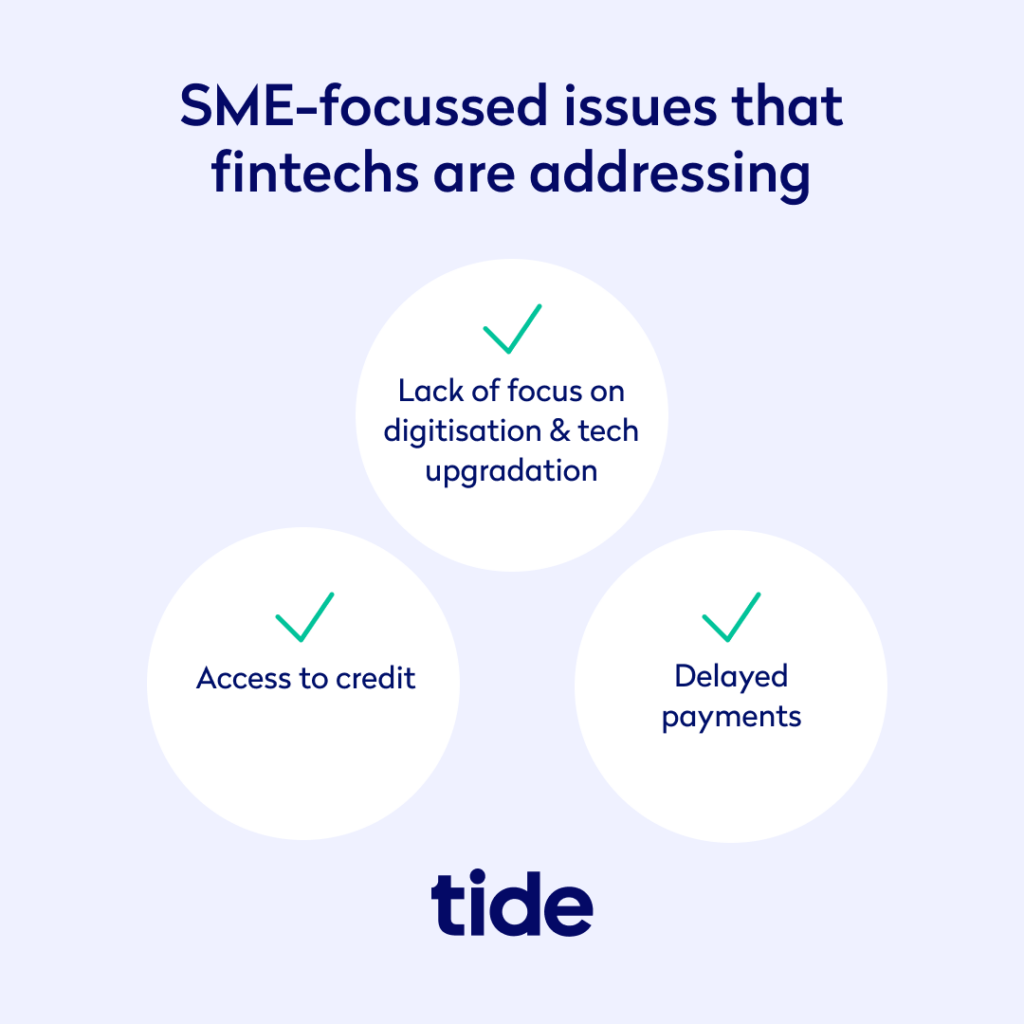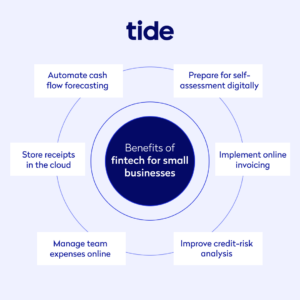
6 ways fintechs are empowering small business owners in India

Today, fintech has taken business banking to the next level.📈 The products and solutions developed by fintech startups have made almost all financial services available on one-stop-shop super apps. Fintechs are providing the much needed boost to businesses, especially medium and small sized enterprises (MSMEs), to flourish in the digital era🧑💻. They are helping entrepreneurs with a wide range of services – from seeking loans within minutes, to conducting KYC online, to availing 24X7 customer service⚡️. As a result, there has been a significant increase in adoption of fintech solutions by entrepreneurs running small and medium-sized businesses in India. 📊
Small business owners have realised that their customers and competitors, both, are spending more and more time online💻. The pandemic has further accelerated the need and the pace of digitisation to catch up with this accelerated online dependency. That’s why it’s so important for entrepreneurs to digitise their business by adopting fintech solutions, so they don’t get left behind.
But where to start? 🧐 At Tide, we’re all about helping you save your time and money, which is why we’ve created this article to explain the different ways fintechs are making life better for small business owners. 💡
Table of contents
- Why fintech?
- Key SME-focussed issues that fintechs are addressing
- Benefits of fintech for small businesses
- Wrapping up
Why fintech?
With a population size of about 1.3 billion, the MSME sector in India has a vital role in the economy. MSMEs are crucial to create a culture of entrepreneurship and generate large employment opportunities in the country. Their importance is only going to increase in the next few years as the country aspires to become a ₹ 5 trillion economy 🇮🇳. Therefore, it is of paramount importance that Indian MSMEs continue their efforts toward becoming increasingly competitive. To that end, embracing fintech has emerged as an ideal approach.
Platforms and solutions developed by fintech startups are playing a key role in empowering small businesses by bringing convenience to their devices and doorsteps📲. Fintechs are helping tackle several issues that affect the growth of small businesses in India. These issues include – resistance to technology adoption, capacity building, lack of access to credit and risk capital and delayed payments, among others. They are also helping them get easy access to products like bank accounts, cards, working capital, managing cash flow, store information securely, and digitise back-office functions, etc.
SME-focussed issues that fintechs are addressing
Access to credit
Credit is essential for the development of the MSME sector. However, if the most recent data from the RBI is taken into consideration, credit disbursal to small businesses has been relatively low. The regulator has stated that the total credit outstanding from financial service providers to the SMEs was approximately ₹ 16.6 lakh crore as at end of September, 2019. This could be attributed to the fact that a lot of small businesses operate in an informal space which makes assessing their creditworthiness difficult. As a result there is lack of data about the business performance as well as credit score which makes it difficult for traditional financial institutions to lend them capital. 🎭
Delayed payments
Small business owners often face the problem of delayed payments. This affects their cash flow and availability of working capital. Any delay in payments adversely impacts their operating cycle. Due to this small businesses find it difficult to to procure new orders or fulfil the existing ones. According to a 2019 survey by RBI, 44% of small businesses engaged in manufacturing activities faced delay in payments. As per data from MSME Samadhaan, an online Delayed Payment Monitoring System by MSME ministry, the number of delayed-payment cases between 2020 and 2021 increased by 96% – from 13,091 to 25,705. 🤯
Lack of focus on digitisation and tech adoption
Inhibition to adopt new technologies such as accepting e-payments can often be observed among small businesses in India. The CISCO India SMB Digital Maturity Study 2020 states that when it comes to digital maturity, India ranks 9th in the small and medium businesses segment in the Asia-Pacific region. The report also states that the digitalisation of small and medium businesses (SMBs) could add USD 158 to 216 billion to India’s GDP by 2024 and contribute to the country’s economic recovery post COVID-19. Fintechs are going to play a crucial role in enabling this growth and the post-pandemic recovery. 👍
Benefits of fintech for small businesses
1. Automate cash flow forecasting
Cash flow forecast is used for predicting how much money will flow in and out of a business. It’s an important tool for small business owners to use when making important business decisions. It helps to alert entrepreneurs about potential changes in cash flow (ups and downs) which could affect their ability to pay taxes, salaries and other charges.
Cash flow forecasting usually involves the use of up to three spreadsheets: a sales forecast, a profit and loss statement and a cash flow forecast. By automating the process, SMEs can get rid of those spreadsheets and focus their time and resources on critical areas of their business 🙌
Some key benefits of automating cash flow insights include:
- Auto-predict your cash flow: It enables real-time view of the forecasts based on the activities of the small business’ account in an easy-to-read graph. It can also help predict a company’s balance ahead of time and send small business owners instant alerts in case of any cash flow problems
- Access credit options: Small businesses can see customised funding options that they are already eligible for, to help them fill a cash flow gap or support business expansion
- Grow your credit score: It is important for small businesses to keep a healthy credit score to get loans easily from traditional and new-age financial service providers. You can track and improve your credit score using the credit score tools integrated in fintech solutions. You can also get real-time updates about the increase or decrease in credit score.
2. Prepare for self-assessment digitally
Self assessment of tax payment is generally a tricky time of the year for entrepreneurs. During this time, small business owners have to balance their business operation with the sum of advance tax, tax deducted at source, etc as well as the deadlines. It’s always best to get ready for your tax return in advance to avoid costly penalties and unnecessary stress. 💡
One way to prepare is to systematically categorise your expenses. Thanks to smart accounting platforms and solutions developed by fintechs, you can organise your income and expenditure into categories that match up with the exact category on the self-assessment form. That way, it becomes easier for you to copy the figures into the corresponding boxes when you’re filling the form online or on paper 🎉
3. Store receipts in the cloud
Consider that you are in a situation where you need to urgently find a receipt. However, all you have are bundles of hard copies and the only way you can find the receipt is by searching manually. Imagine the effort and pain that would go in searching through piles and piles of old documents and the sheer waste of time! And, that’s a nightmare for even the most organised business owners. Additionally, there is always the risk of them being lost, thrown away, stolen or damaged. It’s important to digitally back up your receipts ✅
That’s where fintech solutions with receipt importing feature could be helpful to small business owners. You can securely upload your receipts in your smartphone app or on the web-based app. This way you won’t lose time to mistake-prone data entry. SMEs can also add notes and match them to the relevant transactions too. The ability to download your receipts at any time via the app or from the web, would make it easier to complete tax and expense-related tasks or share them with your accountant.
4. Implement online invoicing
An invoice is an official record of any goods or services you’ve provided to your customers. It is a professional and conventional way to bill them. It is used by small businesses to let their customers know how much they owe, when they need to pay the amount and how to pay it. It also contains information about the sale of a particular product or service, such as buyer’s details, quantity, value, tax, and payment terms & conditions. 🔥
In India, the Goods and Services Tax (GST) law has elaborate laws on invoicing format and issue of invoice or bill. However, our research and several media reports have indicated that the payment delays have for long been a huge problem for SMEs in India. Last year, an EY report estimated that Rs 1.8 lakh crore was owed to small businesses as the money that a company receives for goods or services from customers. Fintech payments solutions have built-in invoicing tools that let you create, send and track invoices straight from your app. You could also chase overdue invoices.
5. Manage team expenses online
Running a small business involves managing a variety of expenses. These could include – new team software, travel costs for business trips, office infrastructure costs, flexi-pay options for employees, etc. There are plenty of costs related to your employees that you need to reimburse them for on a regular basis.
However, much like receipts, paper expense claim forms can be time-consuming and increase the chances of error and fraud. Not to mention, they could divert your time, effort and resources from their core business. It can also be quite confusing for you to keep track of receipts throughout the year. 🤯
Expense management solutions from fintechs can help you get rid of most of the paperwork and give entrepreneurs and their teams the flexibility to make purchases from their account 👌. Not just that – founders can also set spending limits, track purchases through real-time updates and match the receipts to transactions. ⚡️⚡️
6. Improve credit-risk analysis
SMEs can also leverage technology to develop alternative forms of credit risk analysis. Fintech solutions can help entrepreneurs understand and price credit risk effectively and quickly by using artificial intelligence, machine learning and big data analytics. They can help SMEs explore the most suitable form of business credit options – from loans to credit cards.
With the cash flow forecasting feature provided by fintechs, you can understand whether you’ll need extra money coming in. If your cash flow forecast indicates that your business is at risk of running out of cash, business credit could help you stay afloat 🚣 It can be used to:
- Make payments on time such as short-term bills, bank payments and other obligations to ensure that you don’t fall behind
- Cover your operating costs such as employee wages and inventory
- Plan ahead with positive cash flow to move money into areas of your business that need more resource
Wrapping up
To say that fintech is reshaping the world of financial services is quite an understatement. Fintech has become a disruptive force that has transformed the way business owners manage their banking and financial needs such as savings, lending, and other important functions like admin, taxes, expense management, etc.
Investment in fintech solutions is bound to pay off in long-term time and manpower savings for small business owners. At Tide it’s our mission to build the tools small business owners need to automate their business admin so they can go back to doing what they love: run and grow their business








